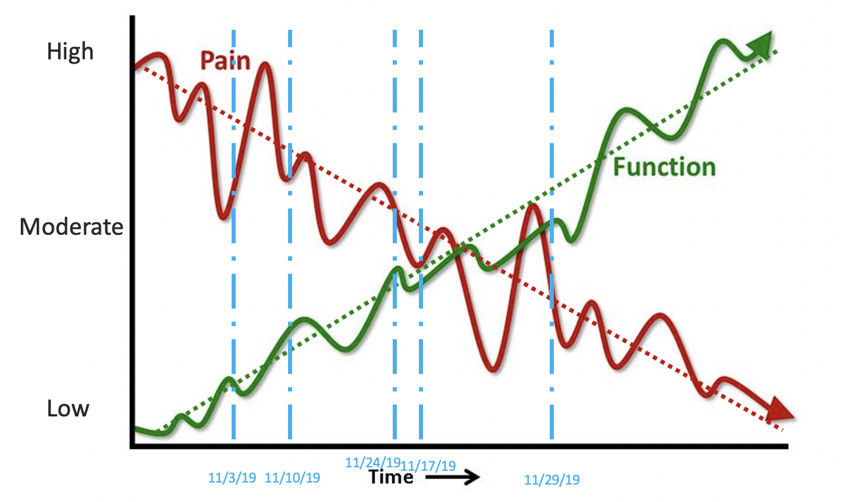
Pain is a complex topic. Depending on who you ask and what their education and prior beliefs are, you can get wildly different answers. Nowadays in the information era, it's even harder to know who you should trust and what information to listen to. We get that, and we've had patients who take some time to understand our explanations and reasonings versus other information they've been provided.
That's why we place a greater emphasis on the functionality of a patient over their pain. When some people hear/read that, they immediately think we don't care. That is absolutely NOT the case, it's just that pain is very much multi-factorial and can be enhanced or amplified by so many factors. Most importantly, when we talk about pain with patients, one of the biggest factors they emphasize is the intensity of the pain, aka the 5/10 or 9/10 on the pain scale. When in reality there is also the frequency and duration or pain. Did the pain last all day or just first thing in the morning? Is it a quick, sharp pain or does it last for hours? Did it get worse in the middle of your day or it's only bad when you sleep?
So many things to consider, but also so many ways to adapt the mindset of pain and how to understand it throughout your rehab process.
In our humble opinion, we'd rather have a 7/10 low back patient who can workout at a moderate intensity and modify their lifts, than a 4/10 in pain and being inactive or sidelined entirely because of the pain.
Here are some more examples to better explain.
A patient who is recovering from knee surgery 5 months down the line has knee pain towards the end of the day after being on their feet all day at work and doing rehab. They are able to perform almost all tasks to function and getting back in the gym more, but their knee still hurts at the end of the day a decent amount.
Compared to a patient with chronic knee pain that isn't that bad, but they've lost a moderate amount of movement in their knee, can't walk without a limp, and haven't been able to workout since their injury.
Whose life do you think is affected more? Which one would you rather be? The knee pain patient with moderate pain, but more function? Or the patient with not so much pain, but considerably less function?
The point is that as humans, we have the drive to perform and get things done. We like to be productive and have independence to get things done. Mentally and physically it is better to have a more painful experience and greater function than it is to have a less painful experience and way less function.
We want you to be able to perform things again as the pain reduces because the progress of your pain during the rehab will inevitable reduce, but without good function and movement, the progress of the pain can diminish at a much slower rate.
When looking for a provider, it's important to find someone who isn't just going to manage your pain levels but inspire movement and new habits that help reduce your pain, improve your movement, and provide you with self-management strategies so you don't have to constantly see healthcare providers.
Our offices are located in Tampa and Pinellas Park
